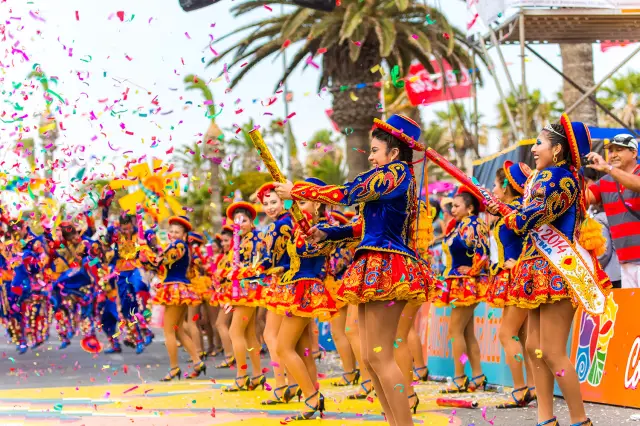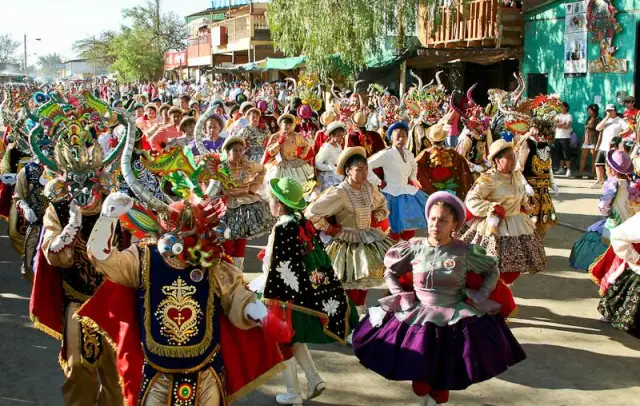Local festivals in Chile are an essential part of the country's cultural heritage. Every corner of this vast and diverse geography celebrates its identity through events steeped in symbolism, religion, art, and folklore. From the northern pampas to the southernmost reaches, passing through fertile wine-growing regions and mystical island landscapes, each region of the country has at least one defining celebration that attracts both tourists and Chileans. This tour of the most important festivals will allow you to experience the soul of Chile from a unique, vibrant, and deeply human perspective.
North Zone
La Tirana (Tarapacá Region)
The Fiesta de La Tirana , celebrated in the small town of the same name, is one of Chile's most popular religious festivals. Every year in July, more than 200,000 people flock to the desert to pay homage to the Virgin of Carmen . The streets are filled with dancers in bright costumes and colorful masks, performing ritual choreography such as the diablada, the morenada, and the tinkus. This religious syncretism combines the Catholic faith with ancient Andean customs, creating a mystical, emotional, and deeply moving atmosphere.
Arica Carnival (Arica and Parinacota Region)
The Andean Carnival with the Power of the Sun is an explosion of color, music, and dance that pays tribute to the Aymara, Quechua, and Afro-descendant cultures of northern Chile. Celebrated in February, it features troupes from across the highlands. The streets of Arica are filled with joy for three days, featuring choreographic competitions, concerts, and ancestral rituals. This carnival has gained international fame and has become a key platform for highlighting the region's intangible heritage.

North Center – Center
La Pampilla Festival (Coquimbo Region)
This celebration is synonymous with the Fiestas Patrias (National Holidays) in the northern region . The Pampilla de Coquimbo begins on September 18th and lasts for several days, becoming a huge, popular family event. On the coastal esplanade, inns, fairs, stages, and camping areas are set up, where attendees enjoy traditional games, Creole food, live music, and traditional competitions. This festival stands out for its warm atmosphere and sense of community, and is an ideal place to experience Chilean culture in all its splendor.
Harvest Festival (O'Higgins and Maule Regions)
The grape harvest is much more than a harvest; it's a tradition that celebrates the work of winemakers and the quality of Chilean wines. It takes place between February and April, depending on the valley, and combines wine tasting with artistic performances, parades, and competitions such as the classic grape stomping. The communities of Santa Cruz, Curicó, and Cauquenes , among others, offer festivals that attract thousands of visitors each year. It's an excellent opportunity to explore wine routes and savor the traditions of the Chilean countryside.
Central-South Zone
Olmué International Folklore Festival (Valparaíso Region)
This event, held in El Patagual Park , brings together the best exponents of national and international folklore. Held in January, it offers a varied program that includes traditional dances, live music, competitions, and workshops. The festival is broadcast nationally and is considered an important showcase for Chilean popular culture. Its rural and family-friendly atmosphere makes it an excellent option for those seeking a vacation full of identity.
Feast of the Virgin of Carmen of Andacollo (Coquimbo Region)
With roots dating back to the 16th century, this religious festival brings together tens of thousands of devotees who make a pilgrimage to the Sanctuary of Andacollo. During the celebration, masses, solemn processions, and ceremonial dances are held, symbolizing the people's devotion to the "Chinita," as the Virgin is affectionately known. It is one of the most powerful displays of popular religiosity in the country and represents a meeting point for faith, culture, and community.

South Zone
Chonchi Traditional Fair (Chiloé Island)
Chiloé culture is one of the richest in the country, and it is powerfully expressed in this fair, which brings together the best of Chiloé's cuisine, crafts, music, and legends. Curanto al hoyo (a traditional dish made with corn, cooked in the pit), tortillas baked in the embers, homemade jams, and wool textiles are just some of the offerings at this festival, which takes place every February. It's an invitation to immerse yourself in a unique culture with deep indigenous roots and a very distinctive worldview.
National Meeting of Pehuenche Chilean Identity (Biobío Region)
Celebrated in communities near the Andes Mountains , this event honors the traditions of the Pehuenche people. It features ancestral wisdom gatherings, traditional product fairs, Mapuche music, and equestrian competitions. The festival fosters respect for the indigenous worldview and promotes cultural tourism in the Andean foothills , offering a simultaneously educational and spiritual experience.
Southern Zone and Patagonia
Snow Festival (Magallanes Region)
Every winter, Punta Arenas dresses in white to celebrate its traditional Snow Festival . This celebration, which includes sports such as skiing, snowboarding, and sled racing, also offers food fairs, artistic performances, and recreational activities for the whole family. It's an excellent way to attract tourists during the off-season and enjoy the southern cold with the joy and Patagonian flavor.
Puerto Natales Traditional Festival
This event blends Patagonian livestock and marine culture. Attendees can enjoy spit-roasted barbecues , craft fairs, live music, and folk and country music competitions. It's a perfect opportunity to experience rural life in the far south, amidst stunning landscapes and unparalleled hospitality.
Insular Zone
Tapati Rapa Nui (Easter Island)
For two weeks in February, the island celebrates its most important celebration. Tapati is a competition between clans to elect the island's queen. Competitions range from stone carving to horse racing and traditional singing. Visitors can join in this unique experience and participate in workshops, ancestral ceremonies, and nighttime parties. It's the perfect time to experience the soul of Rapa Nui.
Frequently Asked Questions (FAQ)
What is the most popular religious festival in Chile?
The La Tirana Festival, with more than 200,000 attendees, is the most popular in the country.Which festivals stand out for their gastronomic component?
The Chonchi Traditional Fair and the Grape Harvest Festival are not to be missed for food lovers.Where are winter festivals held in Chile?
In Punta Arenas and Patagonian towns such as Puerto Natales.What holiday does the Rapa Nui culture celebrate?
The Tapati Rapa Nui, in February, brings together ancestral competitions and rituals.
